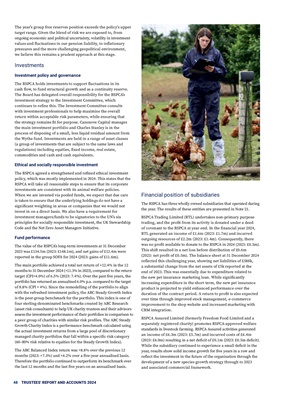
TRUSTEES' REPORT AND ACCOUNTS 2024
48
The year's group free reserves position exceeds the policy's upper
target range. Given the blend of risk we are exposed to, from
ongoing economic and political uncertainty, volatility in investment
values and fluctuations in our pension liability, to inflationary
pressures and the more challenging geopolitical environment,
we believe this remains a prudent approach at this stage.
Investments
Investment policy and governance
The RSPCA holds investments to support fluctuations in its
cash flow, to fund structural growth and as a continuity reserve.
The Board has delegated overall responsibility for the RSPCA's
investment strategy to the Investment Committee, which
continues to refine this. The Investment Committee consults
with investment professionals to help maximise the overall
return within acceptable risk parameters, while ensuring that
the strategy remains fit for purpose. Cazenove Capital manages
the main investment portfolio and Charles Stanley is in the
process of disposing of a small, less liquid residual amount from
the Wythe fund. Investments are held in a range of asset classes
(a group of investments that are subject to the same laws and
regulations) including equities, fixed income, real estate,
commodities and cash and cash equivalents.
Ethical and socially responsible investment
The RSPCA agreed a strengthened and refined ethical investment
policy, which was mostly implemented in 2024. This states that the
RSPCA will take all reasonable steps to ensure that its corporate
investments are consistent with its animal welfare policies.
When we are invested via pooled funds, we expect that due care
is taken to ensure that the underlying holdings do not have a
significant weighting in areas or companies that we would not
invest in on a direct basis. We also have a requirement for
investment managers/funds to be signatories to the UN's six
principles for socially responsible investment, the UK Stewardship
Code and the Net Zero Asset Managers Initiative.
Fund performance
The value of the RSPCA's long-term investments at 31 December
2023 was £134.5m (2023: £148.1m), and net gains of £12.4m were
reported in the group SOFA for 2024 (2023: gains of £11.6m).
The main portfolio achieved a total net return of +12.4% in the 12
months to 31 December 2024 (+11.3% in 2023), compared to the return
target (CPI+4.0%) of 6.5% (2023: 7.4%). Over the past five years, the
portfolio has returned an annualised 6.0% p.a. compared to the target
of 8.8% (CPI + 4%). Since the remodelling of the portfolio to align
with the refreshed investment policy, the ARC Steady Growth Index
is the peer-group benchmark for the portfolio. This index is one of
four sterling-denominated benchmarks created by ARC Research
(asset risk consultants) to help UK charity trustees and their advisors
assess the investment performance of their portfolios in comparison to
a peer group of charities with similar risk profiles. The ARC Steady
Growth Charity Index is a performance benchmark calculated using
the actual investment returns from a large pool of discretionary
managed charity portfolios that fall within a specific risk category
(60-80% risk relative to equities for the Steady Growth Index).
The ARC Balanced Index return was +8.8% over the previous 12
months (2023: +7.3%) and +4.2% over a five-year annualised basis.
Therefore the portfolio continued to outperform its benchmark over
the last 12 months and the last five years on an annualised basis.
Financial position of subsidiaries
The RSPCA has three wholly owned subsidiaries that operated during
the year. The results of these entities are presented in Note 21.
RSPCA Trading Limited (RTL) undertakes non-primary purpose
trading, and the profit from its activity is donated under a deed
of covenant to the RSPCA at year end. In the financial year 2024,
RTL generated an income of £1.6m (2023: £1.7m) and incurred
outgoing resources of £2.2m (2023: £1.4m). Consequently, there
was no profit available to donate to the RSPCA in 2024 (2023: £0.3m).
This shift resulted in a net loss before distribution of £0.6m
(2023: net profit of £0.3m). The balance sheet at 31 December 2024
reflected this challenging year, showing net liabilities of £588k,
a substantial change from the net assets of £5k reported at the
end of 2023. This was essentially due to expenditure related to
the new pet insurance marketing loan. While significantly
increasing expenditure in the short term, the new pet insurance
product is projected to yield enhanced performance over the
duration of the contract period. A return to profit is also expected
over time through improved stock management, e-commerce
improvement to the shop website and increased marketing with
CRM integration.
RSPCA Assured Limited (formerly Freedom Food Limited and a
separately registered charity) promotes RSPCA-approved welfare
standards in livestock farming. RSPCA Assured activities generated
an income of £6.3m (2023: £5.7m) and incurred costs of £6.4m
(2023: £6.0m) resulting in a net deficit of £0.1m (2023: £0.3m deficit).
While the subsidiary continued to experience a small deficit in the
year, results show solid income growth for five years in a row and
reflect the investment in the future of the organisation through the
development of a new species growth strategy through to 2023
and associated commercial framework.